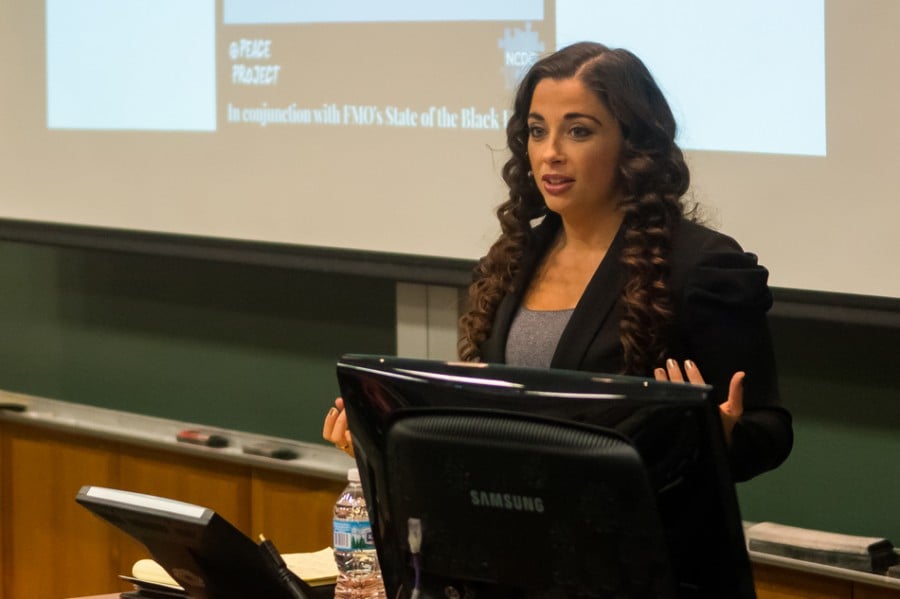Trayvon Martin’s attorney talks losing trial, overcoming hardship
Nathan Richards/Daily Senior Staffer
Jasmine Rand, an attorney who represented Trayvon Martin’s family during George Zimmerman’s trial in 2013, speaks at Northwestern on Thursday. Rand discussed the trial, as well as her experiences as an attorney and professor.
November 14, 2014
An attorney who represented Trayvon Martin’s family spoke Thursday at Northwestern about the George Zimmerman trial and the not-guilty verdict.
The event, titled “Hoodies and Hate Crimes,” was co-sponsored by Northwestern Community Development Corps and Peace Project. Jasmine Rand discussed her experiences as an attorney and professor, as well as the summer 2013 trial.
“What does it feel like to go from being one of the ‘most successful’ attorneys in the world who fought for change … to another year later standing in front of cameras and becoming one of the ‘biggest losers’ in the world?” Rand said. “How do you recover from that?”
Rand began the talk by discussing her definition of a leader. She told the story of being rejected from some of the “worst law schools in the country” and how it helped her become the person she is today.
“I submit to you that the most defining moments of my life are not the ones in which I performed well on CNN or did well on a case,” she said. “They were the moments when life attempted to hand me failure or tell me I wasn’t good enough.”
Rand then recounted her time as an adjunct professor at Florida A&M University. She was teaching a class while she was representing the Martin family, and encouraged her students to draft a press release and lead a press conference about the case. Her students’ efforts culminated in an “I am Trayvon Martin” video.
“My students had the brilliant foresight to encapsulate what this case, this movement means in four words,” Rand said. “Those words went from students’ lips to Obama’s ears in less than a week,” she said, referencing the President’s statement July 19, 2013 that “Trayvon Martin could have been me 35 years ago.”
The trial started a debate about Florida’s “Stand Your Ground” law, which allows an individual to use deadly force if they reasonably feel they are at great risk in a confrontation. Rand explained how these laws stem from a narrower, more sensible law that permitted deadly force against a home intruder.
Rand concluded with a question-and-answer session. When a question was raised about the jury’s decision, Rand said she thinks it was the “biases of the jurors” that led to the decision.
“Maybe it’s the best system, maybe it’s a good system, maybe it’s an okay system, but it’s flawed and leads to what I perceive as a lot of flawed outcomes,” she said.
Lakin Davis, Weinberg senior and co-chair of NCDC, said the organization decided to co-sponsor the event during the summer. The event happened a little over a week after Martin’s mother, Sybrina Fulton spoke at the State of the Black Union.
“(This summer) was the time Ferguson was blowing up, so we decided we’d like to focus on the issues of police brutality and hate crimes and race and how those three things interact,” Davis said. “We found Jasmine (Rand) and thought she was a great fit.”
Airickca Gordon-Taylor, founding director of the Mamie Till Mobley Memorial Foundation and a friend of Rand, said she attended the event because she wanted to support her. Gordon-Taylor, a cousin of Emmett Till, a black teenager who was brutally murdered in Mississippi in 1955, said with the 60th anniversary of Till’s death coming up, there are distinct parallels between Martin’s death and Till’s.
“It’s sad when the same thing is happening so many years down the road,” she said. “If we don’t do something about it now, our children and grandchildren and great grandchildren could be confronted with the same types of situations.”
Email: [email protected]
Twitter: @olivesocean


